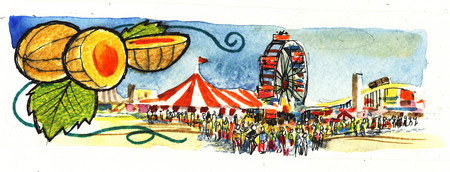Cantaloupe festival in Fallon shows the best of rural Nevada

One of Churchill County’s biggest events, the 24th annual Fallon Hearts of Gold Cantaloupe Festival and Farmer’s Market promises to draw 20,000 visitors over Labor Day weekend, Sept. 4-7. At the Churchill County Fairgrounds, the festival provides fun for all ages with its carnival, junior rodeo, tournaments, contests, music, entertainment, dances and at least 10 commercial exhibits.
Southern Nevadans exploring their own state could hardly find an event that better typifies rural Nevada. Fallon lies 383 miles from Las Vegas on U.S. 95 at its junction with U.S. 50, reached in about a six-hour drive. Those planning to stay in Fallon should make reservations soon, for the town fills up fast with folks from all over northwestern Nevada during this and other special events.
A few ranches dotted the sparsely populated Lahontan Valley along the Carson River before 1900 with the Churchill County seat then in Stillwater. The railroads carried goods and passengers through the area, connected to scattered communities by various short lines. Overland routes such as the Old Pony Express Trail eventually morphed into the first roadways. The area where Fallon now sits boasted a crossroads post office at the Fallon Ranch.
When Theodore Roosevelt became president after the assassination of William McKinley in 1901, important changes came to the West. A conservationist, Roosevelt pushed for the 1902 Reclamation Act, which provided funds for development through the sale of public lands. Plans long rumored about a canal from the Truckee River and a dam on the Carson River to create a reservoir soon became possibilities.
Land developers and legislators (sometimes one in the same) envisioned an oasis of farms and ranches in a well-watered Lahontan Valley. They platted a new town, named it Fallon, moved the count seat from Stillwater and constructed a new courthouse by 1903. Fallon became an incorporated town in 1908. The dams, canal and reservoir followed. Electricity generated by the outflow from Lahontan Dam lit up Fallon in 1912. New settlers flocked to the area watered by the Newlands Project, many homesteading, others starting businesses.
By the 1920s, the land put into production yielded products shipped all over the country, including protein-rich alfalfa prized by cattle ranchers, turkeys that reached the White House dining table and Hearts of Gold cantaloupe so big and full-flavored they were in demand everywhere. Agriculture remains strong in the valley with 70 percent of the alfalfa shipped out-of-state.
New ventures include vineyards, a winery and an experimental distillery of fine spirits from Nevada-grown crops.
During World War II, the military came to Fallon at the Fallon Naval Air Station. Later developments extended the runways and created a pilot training base. The military remains a strong component of the region’s economy.
The Hearts of Gold Cantaloupe Festival opens with free admission Sept. 4 from 7 p.m.-midnight. Admission charges the rest of the weekend are $5 for adults, $3 for military personnel and seniors, $2 for youngsters aged 5-16 and free for those under 5 years. Country-western music, a teen dance, a carnival, a beer garden and a bar featuring cantaloupe daiquiris keep visitors busy.
The festival opens Sept. 5 and Sept. 6 at 10 a.m., using indoor and outdoor facilities. Festival-goers enjoy choices among concerts, dancing, entertainers, games, contests and tournaments of all kinds until midnight. The carnival continues throughout the weekend. Some of the more entertaining contests involve cantaloupes in bowling, bocce ball and Plinko, cantaloupe chucking and cantaloupe eating. You can even learn how to use cantaloupes in cooking. Family-style attractions include a petting zoo. Junior rodeo events continue Sept. 5 and Sept. 6 from 8 a.m. to 5 p.m. Evening brings concerts under the stars.
Sept. 7’s events get under way following the downtown Labor Day Parade. The fairgrounds open at noon. Finals for many contests and tournaments take place during the afternoon with awards presentations. The grounds close at 5 p.m.
Margo Bartlett Pesek’s column appears on Sundays.